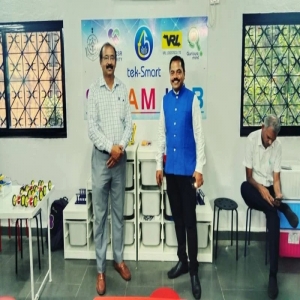
 Pachu Menon
Pachu Menon

In today's rapidly changing world, there is a growing consensus that education must extend beyond textbooks and traditional examinations. In pursuit of such a 'curriculum,' schools and parents alike are seeking innovative ways to prepare students for the challenges of tomorrow.
With a clear understanding that the combination of creativity, curiosity, and critical thinking leads to the development of tomorrow's innovators, problem solvers, and leaders, efforts are underway to foster an educational environment that actively encourages these cognitive skills in students.
Through curriculum design and teaching methods essentially aiming to cultivate a generation of individuals capable of tackling complex challenges with a holistic and innovative approach, modern education intends to move beyond the traditional methods of learning and teaching to one that seeks to promote collaborative and learner-centred approaches, and leverage technology to personalise and enhance the learning experience.
The first STEM laboratory at Murgaon High School in Headland Sada, Vasco, is a unique initiative which aims to foster creativity, innovation, and a strong interest in science among students. It was inaugurated by the Chief Minister on March 5, 2025. As a collaboration between the Goa Corporate Social Responsibility Authority and VRL Logistics, the state-of-the-art STEM (Science, Technology, Engineering, and Mathematics) Lab aims to provide hands-on learning experiences that encourage student innovation and prepare them for future careers.
With various such initiatives in the making, it is more than evident that new educational trends are heavily leaning towards technology. Coding and robotics are increasingly integrated into school curricula to foster essential 21st-century skills, including problem-solving, creativity, computational thinking, and collaboration, thereby preparing students for future technology-driven courses. These subjects make abstract concepts tangible, connect different STEM fields, and build digital literacy.
"We are entering an era with ... job opportunities, driven largely by rapid technological advancements like Artificial Intelligence and the growing emphasis on sustainability, which are creating roles like AI Ethicist, Prompt Engineer, Data Scientist, Drone Operator, and Sustainability Manager that were previously unimaginable." (The Economic Times)
These emerging fields, alongside the rise of the digital economy, are reshaping the job market, creating high-demand career paths in areas such as healthcare, technology, and eco-friendly initiatives.
One of the most significant areas where technology has had a profound impact is the job market. This means that technological ignorance will put a candidate at a distinct disadvantage in the job market! From the rise of new industries to the automation of routine tasks, technology is reshaping the employment landscape, presenting both opportunities and challenges for companies and workers alike.
At an interactive session I recently attended, students from a Higher Secondary school in South Goa were lectured on 'Artificial Intelligence and its impact on Careers.' Eliciting a mixed response from the youngsters, job loss and unemployment featured prominently as their apprehensions during the discussions. While AI adoption is expected to cause some job displacement, with estimates varying from a modest, temporary impact to a significant job transformation, its broader economic effects also include potential job creation, increased productivity, and the emergence of new roles requiring human skills.
Over the last few decades, education has undergone significant experiments driven by technology, a shift toward student-centred and interactive learning, and alternative educational philosophies, alongside reforms in curriculum design and assessment methods.
It is argued that experimenting with education leads to improved learning outcomes, fosters critical thinking, enhances student engagement, and helps educators discover more effective teaching strategies and interventions. It also provides a means to gather evidence for education policy and reforms, enabling informed decision-making and continuous improvement in educational practices.
The contention that "Politicians, policy makers, and reformers have been implementing one change after another for over one hundred years now, and in truth, it does not appear that they are going to stop creating new mandates any time soon," leaves little room for disagreement or debate.
In any case, education is no longer what it was. While formal school was once highly structured and theoretical, current trends emphasise interactive, student-centred learning, experiential education, and lifelong growth. Despite these shifts, the core goal of education remains constant, though its methods and scope continue to evolve.
Education should open venues for reasonable employment. However, it is quite concerning that education contributes to modern unemployment through a mismatch between graduates' skills and employer demands, as well as excessive educational expansion outpacing job creation.
Modern educational methods intend to address the present unemployment scenario by promoting vocational and skill-based training, fostering entrepreneurship, and strengthening industry-academia linkages to create a workforce equipped with industry-relevant skills.
The world is rushing towards an 'automated ambience.' The global trend of incorporating automation into daily life and work, driven by AI and robotics to enhance convenience, efficiency, and productivity, is more than evident.
It also raises important questions about striking a balance between human participation and automated systems to mitigate potential downsides, such as job displacement. Experimentation is vital for pedagogical improvement!
It is essential to understand that experimenting in education must be balanced to avoid compromising employment outcomes by integrating relevant labour market information. Care must be taken to ensure that educational innovations prepare students for real-world careers, rather than pursuing new methods at the expense of fundamental skills, such as literacy and numeracy, which are essential for productivity and lifelong learning.